EDITOR’S NOTE: This piece was written during the 2023 WGA and SAG-AFTRA strikes. Without the labor of the writers and actors currently on strike, films like “Barbie” wouldn’t exist.
Up until a certain point, Barbie is a clever clinic in subverting both expectations and big ideas. The film skips with a confidence down a pink brick road where its own marketing campaign calls itself a movie for people who love and hate Barbie. For a majority of the time, this aspiring blockbuster shoulders a heavy grain of salt, cakes makeup on the eye it’s winking, and smiles its collective pearly whites as wide as possible to cover a tongue stuck in its cheek because it knows it’s asking a great deal of its audiences.
Leave it to an seemingly unglamorous human character to drop the most valiant explosion of truth to change all of what was being subverted in Barbie. At a dramatic peak, America Ferrera, playing a working mother named Gloria helping Margot Robbie’s wayward lead Barbie return home, pontificates a diatribe for the ages that succinctly spells out many of the inequalities and contradictions besetting women. She lays it all out there with every boom and mic drop possible, and the profundity explodes synapses on-screen and off.
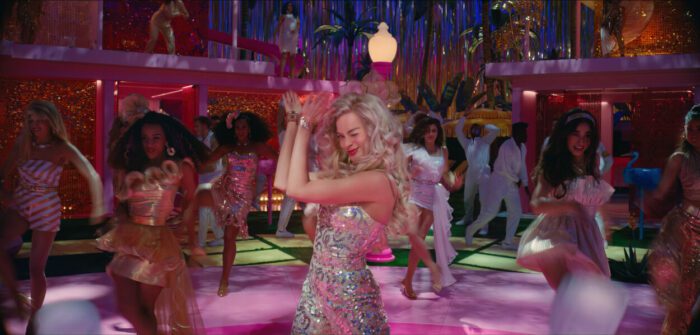
Before that moment, the dolls of the show are merely vessels and targets for competing mindsets and purposes. In this pivotal scene carried by Ferrera’s words and Robbie’s reactions, Barbie convinces you of its grander purpose and sterling value towards defining personal identity without assigned labels and accessories. Every kittenish joke, dabbled concept, and twinkling dream that was floating in this fantasy earlier is now tethered to the human condition. That feat, on its own, is brilliant in a bonkers movie like this, but there’s more.
It’s not enough in the movie for one person like Gloria to vocalize the multi-faceted plight of womanhood. There’s still all the men too. Barbie aims for justification and action beyond merely being heard and touts messages that are unrestricted to gender or age. Just when you think this movie was already asking enough with this climactic declaration of hope, it leaps even further to keep challenging its audience to keep answering thoughts and convert a few hearts and minds. Achieving all of that under the guise of a shamelessly farcical adventure makes Barbie one of the most special and effective satires you’ll ever find.
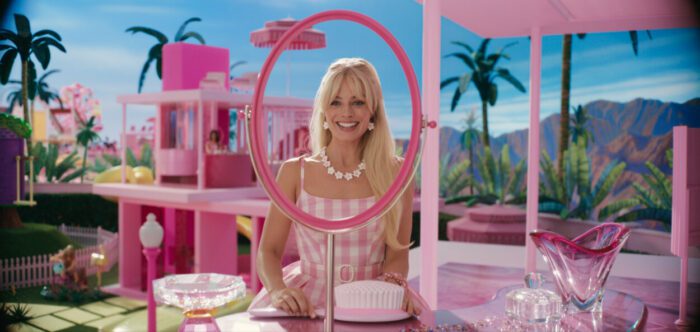
How Barbie gets to those transformative tipping points is thanks to a spark of existential dread. Manifested by breathtaking production design work by six-time Academy Award nominee Sarah Greenwood (Atonement) and splendid costumes by two-time Oscar winner Jacqueline Durran (Anna Karenina), “Barbieland” is where the corporeal toy dolls populate their own fuchsia utopia. The realm is operated by the myriad of manifestations from Barbie’s catalog of inclusive jobs and careers, from Lawyer Barbie (Jerk’s Sharon Rooney) and Physicist Barbie (Emma Mackey of Emily) on up to President Barbie (Insecure creator/star Issa Rae). The many super competitive Kens (including co-headliner Ryan Gosling and current Marvel stars Simu Liu and Kingsley Ben-Adir) are there to dote on the Barbies like Frankie Avalon to Annette Funicello. Everything’s the bee’s knees with parties all day and night until the centrally popular Stereotypical Barbie (Robbie) asks if anyone thinks about dying.
The record-skipping pause upon that uttered question during a choreographed dance shocks the room and starts unraveling Barbieland’s brand of normalcy. Background lyrics shift, environmental items sour, and the paragon of female perfection discovers sad, complicated feelings and, GASP… cellulite! After consulting the maverick outcast Weird Barbie (former Saturday Night Live scene-stealer Kate McKinnon), Barbie learns of the symbiotic bond between toy and owner and sets herself on a journey to the real world to find her owner and fix the glitches. Tagging along is Stereotypical Barbie’s top pining Ken (Gosling) whose default quest is getting noticed enough to make the “and” conjunction between he and Barbie more exclusive and official.
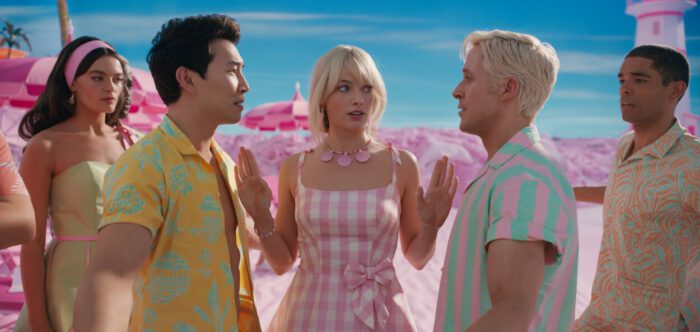
Entering reality rollerblading at LA’s Venice Beach, Barbie and Ken find an upside-down world from Barbieland’s idyllic lifestyle. Expecting a thankful world like her own, Barbie is now the lesser societal figure met by summative dismissal, catcalling, and the misogynistic male gaze in a world where many consider her a false ideal. Some of that treatment is enhanced by Barbie’s own creators at the Mattel toy company, where Will Ferrell’s haughty top executive negatively equivocates “sparkle” to female agency. Conversely, Ken is tasting male dominance for the first time, experiencing loosened consequences, and dives into making patriarchy happen back in the female-dominated Barbieland. The pickle of Barbie gets more precarious, spicy, and kinetic from there as the ignorance of men overflows and sullies the rosy paradise.
Heaven forbid existential thoughts, evolved gender roles, and pertinent social commentary invade a perfect world! Celebrated Lady Bird and Little Women director Greta Gerwig and her dual life-and-writing partner Noah Baumbach (Marriage Story) uncork a cascade of heady topics that are more potent than the satire of Shrek or The LEGO Movie in comparison. Not because of anything particularly raunchy or offensive, Barbie is decidedly a PG-13 movie. The possibly uncomfortable starkness of it all may confound or fly over the heads of younger viewers, meaning this movie should be a shared experience instead of an unsupervised distraction tool.
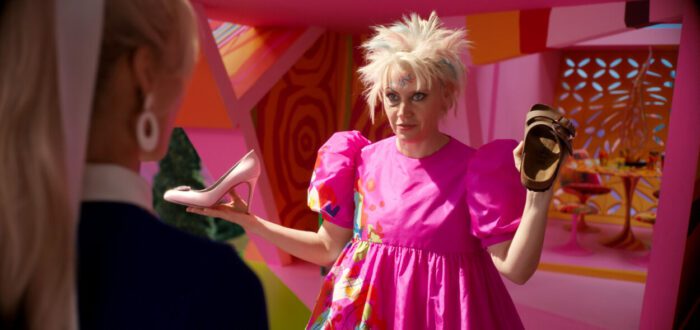
Honestly, the movie is better for its route of vigor and candor shaded by the sumptuous production value. Shine and substance are given equal attention and intensity. The talking points Barbie triggers—ranging from representation, dignity, self-esteem, serialized consumerism, and, SECOND GASP!… even fascism—deserve their callouts. They detonate with an optimistic spirit and an exponential self-awareness. Starting with Gerwig and carrying over to the actors, there is a mindful and courageous responsibility present with everyone involved in presenting the tricky and pithy pillars Barbie confronts.
Not unlike their co-star Will Ferrell 20 years ago when he charmed us to pieces in Elf, Margot Robbie and Ryan Gosling succeeded in expressing a commitment to the bit, so to speak. They’re playing genitalia-less dolls with one-track minds forcibly derailed and righted by a wellspring of feelings that need to be interpreted in an entertaining yet genuine fashion. Comedy like that is not easy. Actors in those spots cannot get away with relying solely on the trait of naivety. They have to present a capacity to evolve their characters toward smarts and empathy, all while making us laugh. In that regard, Robbie and Gosling give nothing short of award-worthy performances.
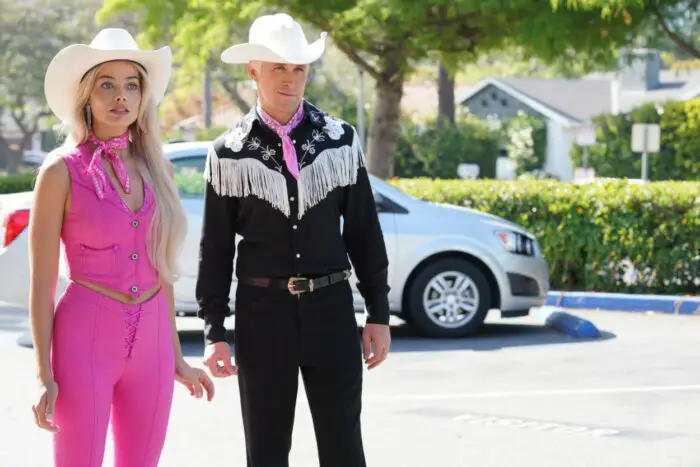
For example, beyond the acting, one key of Barbie turns out to be recognizing and loving imperfection. Halfway through the movie, an old woman of auspicious origins played by Rhea Perlman comments to Robbie’s Barbie about how she looks different and receives the excuse of “I normally look perfect,” only to quickly reply “it never is and isn’t that marvelous?” Pushing back against the usual Barbie knock of unrealistic body images, one individual’s perceived flaws are another person’s unique distinctive details. Female and, yes, male characters alike present those sometimes terrifying trepidations and look to curb ignorance and hate in doing so..
Whether it’s imperfection, ingrained inclusiveness, finding one’s independence, supporting feminism, or wavering imagination that comes with age, the life lessons flow out of Gerwig’s impressive and priceless film with unbridled creativity. It would take think pieces triple the length of this review to examine and address them all. Because of that stupendous and intelligent depth, nothing about Barbie is fluff versus its rainbow-colored and corporate-created exterior.
Speaking of colors and style, I’ll leave you with this little tidbit of snazzy advice from the movie that mixes with the philosophical slant of Barbie itself. Pink goes with everything. Taking that further into color psychology, pink is said to be a contradictory color associated with innocence, calmness, sensitivity, and optimism as much as it’s the standard bearer for femininity. Those listed qualities are the fluttering feelings of Barbie worn with pride, and that’s a radiantly beautiful thing.




Great read!
Thank you, Paul!